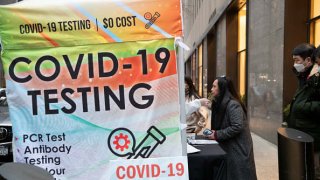
- The omicron variant is spreading in the U.S. and now represents 3% of Covid samples analyzed in the U.S., according to the Centers for Disease Control and Prevention.
- A week prior, the variant represented less than 1% of samples analyzed by the CDC.
- The United Kingdom issued a level 4 Covid alert on Sunday, a step below the highest warning level.
The omicron Covid-19 variant first detected in southern Africa about a month ago now makes up about 3% of cases sequenced in the U.S., according to data from the Centers for Disease Control and Prevention.
While the delta variant still dominates the U.S. at about 97% of all Covid cases analyzed, omicron is quickly gaining ground. The new variant represented an estimated 2.9% of all cases sequenced last week, up from 0.4% the previous week, according to the CDC.
More than two dozen states have reported omicron cases so far. California was first to confirm an omicron case in the U.S. on Dec. 1 in a resident who flew into San Francisco from South Africa. But the CDC on Friday said they've confirmed an earlier case of omicron in a patient who developed symptoms on Nov. 15. It's not clear when the variant first arrived in the U.S.
Get South Florida local news, weather forecasts and entertainment stories to your inbox. Sign up for NBC South Florida newsletters.
The CDC on Friday said one vaccinated person has been hospitalized with omicron, but no deaths have been reported among the 43 patients that have been followed up on. The most common symptoms so far are cough, fatigue, congestion and a runny nose.
Among those patients, 58% were between the ages of 18 and 39 years of age and 79% were fully vaccinated at least 14 days before symptom onset or testing positive.
Money Report
The CDC reported that 33% of the 43 patients traveled internationally during the 14 days prior to developing symptoms or testing positive, indicating that community spread is underway in the U.S.
Scientists and public health experts have said omicron is very contagious, though little is known about whether the variant causes more mild or more severe disease than delta. The United Kingdom issued a level 4 Covid alert on Sunday, a step below the highest warning level. Prime Minister Boris Johnson on Monday confirmed the first omicron death in the U.K. on Monday, warning that Britain faces a "tidal wave" of omicron infections.
U.K. Health Secretary Sajid Javid said on Monday that omicron is spreading at a "phenomenal rate" with cases doubling every few days. Last week, Javid warned that the U.K. faces more than 1 million omicron cases by year end.
CDC Director Rochelle Walenksy said on Friday that the U.S. is not facing the same urgent timeline as the U.K. on omicron. "I don't expect will be on the same time horizon as U.K. and we're continuing to follow cases and we'll look at that carefully," she said during a White House Covid update on Friday.
However, Dr. Michael Osterholm, director of the Center for Infectious Disease Research and Policy at the University of Minnesota, believes omicron will likely overtake delta in the U.S. soon.
"It's just a matter of time before omicron becomes the dominant variant here, and I think that could happen relatively quickly," Osterholm told CNBC on Thursday.
The U.S. is reporting nearly 120,00 new cases per day, based on a seven-day average of data compiled by Johns Hopkins University, flat over the past week but up 25% from before Thanksgiving
About 66,500 Americans are hospitalized with Covid-19, according to a seven-day average of Department of Health and Human Services data through Monday, up 22% over the past two weeks. Though rising, that is still lower than the delta wave's peak when more than 100,000 patients were hospitalized with the virus in early September.






